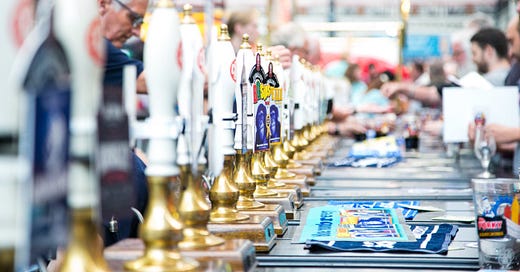Get in the festival spirit
Beer Festivals: a great British tradition (Laura Hadland, Camra Books £15.99)
By Phil Mellows
When the time comes, they might want to inscribe these few words on my gravestone: ‘I’d rather be down the pub’. They speak a universal truth, in my odd little universe at least, that holds even when I’m at a beer festival.
That’s not say I don’t go to beer festivals. I go to quite a lot when I think about it. In the past few weeks I’ve been to the one that opens Norwich City of Ale – a month-long event that continues in the pubs until June 22, the Beltane (or May Day) Festival at the Duke of Wellington in Shoreham, Sussex – conveniently staged in a pub, and the Manchester Craft Beer Festival.
It was at the latter where, despite finding some interesting beers, I had that familiar urge to get out and go to the pub (or in this case the Balance Brewing taproom, which did the trick). I just feel a little lost in these big open spaces, wandering round and round the stands. And I have to say the background music echoing through the cavernous hall didn’t help.
But I’ll be back on the festival trail soon. Camra’s Great British Beer Festival (GBBF) moves to Birmingham the summer, so I can’t miss seeing what that’s like. I’ll also be at the London Craft Beer Festival, sibling to the Manchester one, though I’m disappointed it has moved out of Tobacco Dock, which did offer some architectural interest.
And there are a pair of brewery-run festivals I aim to get to: Verdant’s Little Summer Beer Bash and Beak’s These Hills.
If I need more, there are plenty to choose from. Now we are in festival season there are dozens happening all over the country every week. Follow Beer Fest Buddy and you’ll see what I mean.
It demonstrates that beer festivals have become an established part of our national culture, and that Laura Hadland’s new book is timely, if not overdue.
Beer Festivals: a great British tradition is, mostly, a history of a phenomenon that dates back, surprisingly, to the 19th Century but didn’t really take off until the 1970s when the newly-formed branches of the Campaign for Real Ale began staging alternatives to more commercial, and sometimes pretty dodgy, offerings.
A spread in the Camra newspaper What’s Brewing in September 1974, reproduced in the book (it’s very well illustrated), is telling. Journalist and campaign founder Michael Hardman contrasts the shockingly mysoginist World Beershow with the Cambridge Beer Festival under two headlines: “A cross between an orgy and a trade display” and “Amateurs show the big boys how it’s done”.
And they did. The Cambridge organisers took their experience to national level the following year, staging a Camra festival in Covent Garden which, in 1977, became the first Great British Beer Festival at London’s Alexandra Palace.
Such are the facts, but throughout the book Hadland’s greater strength is the way she brings it all to life through extended quotations from the people who were there, including the volunteers who continue to make sure Camra’s festivals happen despite the many logistical challenges. If nothing else, it’s a remarkable exercise in oral history.
She also shows how the beer festival has evolved over the past half a century and now takes many different forms. Camra’s branches still deliver hundreds of festivals a year on a very similar model to that pioneered by Cambridge, and they are joined by pub festivals, brewery festivals and what Hadland calls “independent” festivals which include those specialising in craft beer and the likes of the London Brewers Alliance Festival.
Perhaps she should also have also included my local one in Brighton, the Hanover Beer Festival, which will celebrate its 36th year this coming October and claims to be longest surviving non-Camra festival.
Hadland concludes by assessing the value of beer festivals in bringing people together, celebrating beer and introducing drinkers to a large variety of brewers and styles under one roof, or tent. They could, she concedes, welcome a more diverse audience even if Camra did play its part in consigning the World Beershow to the dustbin of history.
As I’ve written elsewhere recently, beer events continue to be predominantly white affairs, and women still face problems when they dare to drink with the men. But there is progress, and it felt genuinely liberating when the GBBF made diversity its theme in 2019.
So, though they do make me uncomfortable at times, I do believe beer festivals are a good thing. From my seat at the Beer Breaks bar I’d suggest you could do worse than build a short holiday around one, taking in the local pubs and other attractions. There’s another book you’ll need for that, of course.
Photo of the Great British Beer Festival © Camra



